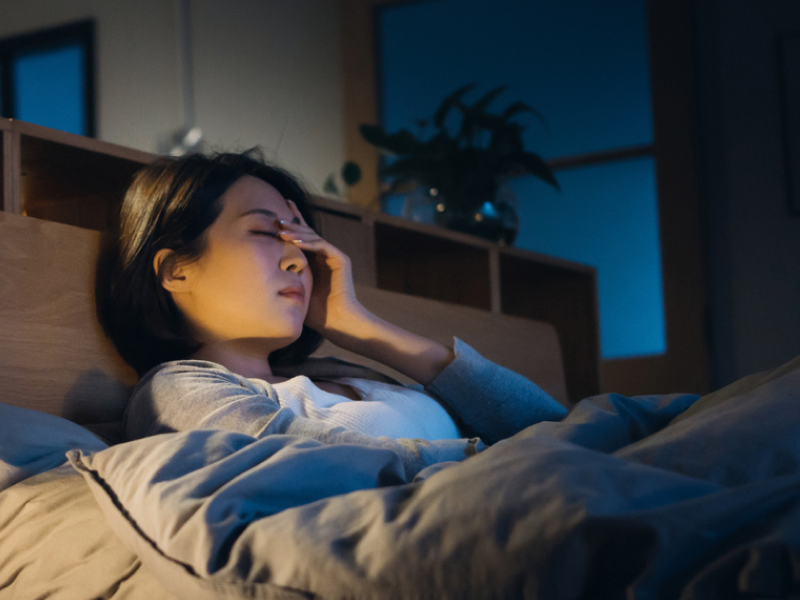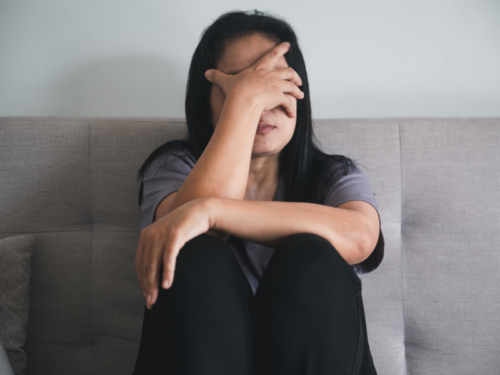
Table of Contents
Is It a Nightmare or PTSD Night Terror?
Written By: Charlie Health Editorial Team

Clinically Reviewed By: Dr. Don Gasparini
February 12, 2024
5 min.
Vivid and distressing dreams about past traumas with embodied symptoms are known as PTSD night terrors. Here’s how to cope.
Learn more about our Clinical Review Process
Table of Contents
For people with post-traumatic stress disorder (PTSD), the memory of past traumas can feel constant, even during sleep. Known as a night terror or sleep terror, these vivid and distressing dreams are a common symptom of PTSD.
“Night terrors tend to be much more vivid and memorable than typical dreams,” said Rebecca Holland, PMHNP-BC, a Charlie Health Psychiatric Mental Health Nurse Practitioner. “They produce symptoms that don’t occur on a purely subconscious level,” she added, noting that symptoms can include acting out of dreams. Other common symptoms of night terrors are restlessness, screaming, or other physical signs of distress.
Below, we delve into the difference between a PTSD nightmare and sleep terror, why sleep issues are common in people with PTSD, and how to cope with PTSD nightmares and other sleep disturbances.

Get help managing PTSD symptoms
Being trauma-informed virtual therapy today.
What are PTSD night terrors?
As mentioned, PTSD night terrors are nighttime episodes related to past traumas where people may thrash, scream, or sometimes hurt themselves or others with disruptive behavior. “A lot of time, people with PTSD may have night terrors where they relive major traumatic experiences that have shaped their mental health,” said Holland.
Unlike other kinds of dreams or nightmares, the intensity of night terrors can lead to significant distress and impairment in daily functioning. They can also worsen sleep quality and PTSD symptoms, causing a cycle of distress and sleep disruption.
PTSD night terrors vs. nightmares
Both a PTSD nightmare and night terror are projections of the experiences we’ve been through or experiences that we’re concerned may happen. However, these two kinds of distressing dreams differ in terms of their symptoms, timing, and level of awareness for people with PTSD. Here’s a breakdown.
PTSD nightmares
A nightmare is a vivid and distressing dream occurring during rapid eye movement sleep (also known as REM sleep), which often happens later in the sleep cycle. During nightmares, people usually know they are dreaming. The sleep disturbance usually lasts a few minutes, after which people wake up. Physical responses like increased heart rate and sweating are common.
PTSD night terrors
A night terror, by contrast, is a sleep disturbance that involves intense fear or panic, and people don’t usually remember what happened afterward. Also, night terrors can happen during any sleep stage, most commonly in non-REM sleep early in the night. While nightmares are a frequent symptom of PTSD, night terrors are a sleep issue that happen less often.
How and why does PTSD affect sleep?
Sleep problems are common in people with PTSD, research shows, ranging from nightmares and insomnia to periodic leg movements and disruptive nighttime behaviors. Here are some reasons why PTSD affects sleep.
Memories of past traumas
While people with PTSD may notice memories of past traumas coming up in many parts of their lives, dealing with triggers at nighttime can actually be more challenging and affect sleep. “Sometimes, triggers that come up during the day can be easier to deal with because there are more distractions. We’re busy and occupied, and all those thoughts come at night,” said Holland. “At night, we’re left with our remaining thoughts, forecasting what’s going to happen today, tomorrow, now,” she explained, noting that this rumination can make sleep more challenging.
Hypervigilance
Holland notes that hypervigilance, another common PTSD symptom, is a huge part of why people with the condition struggle to feel rested. “When in a state of hypervigilance, a person is not ever fully shutting down and recharging,” she said, explaining that when someone is constantly on edge or in a heightened state of arousal, it’s difficult to relax or even fall asleep at all. “We need that rest to recover, but being constantly on edge makes it impossible to go through the proper stages of sleep.”
And, when rest does come, hypervigilance can exacerbate the likelihood of nightmares or night terrors, said Holland. “When our brain is in a hypervigilant place, it’s constantly in fight or flight mode, which can lead to the brain trying to work things out and producing alarming images and scenarios while we’re asleep.”
Anxieties about sleep
Constantly experiencing nightmares, night terrors, or other sleep disturbances may make people with PTSD avoid sleep due to anxiety about reliving past traumas. Sleep deprivation, though, can make sleep disturbances worse. Also, chronic sleep disruption can actually worsen PTSD symptoms, leading to a vicious cycle where sleep deprivation and PTSD symptoms mutually reinforce each other.

Seeking mental health support for PTSD night terrors
Getting professional mental health support is an important step in addressing PTSD night terrors (or frequent nightmares), especially since these disturbing dreams can significantly disrupt sleep and overall mental health. “Therapy is really going to be the most supportive form of long-term recovery because it teaches you the skills to work through trauma underlying PTSD and night terrors,” said Holland.
Holland specifically recommends connecting with a trauma-informed provider who practices trauma-informed therapy, like trauma-focused cognitive behavioral therapy (TF-CBT). She said that processing your emotions will help improve sleep quality. “Working through the trauma in therapy rather than working through it in your sleep means it’s not recurring during the sleep cycle,” she said. Cognitive processing therapy, exposure therapy, and eye movement desensitization and reprocessing are other therapies recommended for treating PTSD.
The role of medication in addressing PTSD night terrors
Another “tool in the toolbox” (as Holland puts it) for managing PTSD night terrors is medication. “From a pharmaceutical standpoint, there are medications that are specifically targeted for post-traumatic stress symptoms like nightmares, vivid dreams, and night terrors, which a lot of people seem to not know about,” she said.
It’s essential to work closely with a psychiatrist or other qualified healthcare provider when considering medication for PTSD-related night terrors. They can evaluate your specific symptoms, medical history, and any potential risks or side effects associated with the medications to determine the most appropriate treatment approach for you. Additionally, Holland recommends that medication be used in conjunction with therapy and other supportive interventions for the best outcomes in managing PTSD symptoms.

How Charlie Health can help with PTSD night terrors
If a young person in your life is struggling with sleep terrors, frequent nightmares, or another PTSD-related sleep issue or symptom, Charlie Health is here to help. Charlie Health’s virtual Intensive Outpatient Program (IOP) provides more than once-weekly mental health treatment for young people and families dealing with complex mental health conditions. Our expert clinicians incorporate trauma-informed, evidence-based therapies into individual counseling, family therapy, and group sessions. With this kind of holistic treatment, managing sleep terrors and recurrent nightmares is possible. Fill out the form below or give us a call to start healing today.




